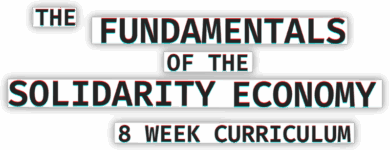Session 1 Resources
Capitalism & Ecocide

In this introductory session, we will develop our understanding of capitalism and its origins - diving into its history and drawing on works by key social thinkers, historians, feminists, and ecologists - to better conceptualize the global climate crisis we are experiencing. Let’s analyze the link between capitalism and eco-destruction and then explore ways the economy can function when capital is not our main focus. Is that even possible?! Yes, yes it is.
Learning Outcomes
- Set expectations and get introduced to the program format and materials
- Gain a general understanding of the Social Solidarity Economy (SSE) and how it relates to the climate crisis, capitalism, and what we can do about it
- Learn the history of ideological thought, including the popularization of capitalism as economic model, and how we can shift away from current oppressive systems
- Leave with an understanding of the various critiques of capitalism - from ecologists, feminists, and economists
Read
What “Capitalism” Is and How it Affects People
Learn the basics of what capitalism is and how it affects society.
Watch
Defining the Economy - Like an Orange
How have we come to view the economy, and how is that impeding our ability to dream of what could be? This short video uses an orange to represent our economy and challenge dominant thought.
Read
Accumulation by Dispossession
This article traces how capitalist growth has historically (and continues to) depend on “accumulation by dispossession,” especially through resource extraction, land seizure, and dispossession of Indigenous communities.
Read
The Solidarity Economy as a Strategy to Mitigate the Climate Crisis
Capitalism is a leading cause of the environmental crisis we are seeing today. Is the Social and Solidarity Economy (SSE) a viable solution?
Read
Solidarity Economy: Building an Economy for People & Planet
This report by Emily Kawano gives a good overview of the solidarity economy movement in the US.
Read
Slaves: The Capital that Made Capitalism
“While slavery existed in human societies since prehistoric times, chattel status had never been applied so thoroughly to human beings as it would be to Africans and African-Americans beginning in the sixteenth century.”
Read
The Factory in the Family
Discusses the ongoing attempt by feminists to give value to unpaid labour which is overwhelmingly gendered.
Read
How to be an Anti-Capitalist Today
Thoughtful sociologist Erik Olin Wright contrasts four approaches: taming capitalism, smashing capitalism, escaping capitalism, and eroding capitalism.
Explore
A Shareable explainer: What is the Solidarity Economy?
There’s a growing openness to new narratives, new models, and new paradigms: the solidarity economy offers a transformative pathway to a new system beyond capitalism
Listen
Our Ecological Imperative
In this episode of All Things Co-op, Cinar and Kevin discuss the issue of the environment,
its destruction, the cause (spoiler alert its capitalism) and the only true way we can address this looming crisis.
Explore
Solidarity Economy Principles
Solidarity economy (SE) is an organizing framework for those who wish to create a systemic change to transform the economic activities that meet our material needs.
Explore
Tree Workers Industrial Group
Tree Workers’ Industrial Group (TWIG) is a grassroots advocacy group that is pushing for worker representation in the silviculture industry.
Explore
Climate Justice Montreal
CJM is a group pursuing environmental and climate justice through education, mobilization and collective action in solidarity with directly affected communities.
Watch
Interview: Rebecca Adamson
Indigenous economist, Rebecca Adamson. Touches on values, humility in relationship to land, and spiritual approaches to negotiations and power.
Contact:
Hannah Ostiguy Hopp
programs@solidarityeconomy.ca

